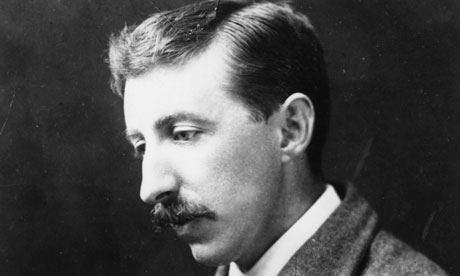
Why didn't EM Forster write much of anything in the second half of his life? According to a new biographer, Wendy Moffat, who has had access to Forster's private papers, what knocked him off song was losing his virginity in his late 30s.
He slept with a wounded soldier in Egypt, in 1917 – "losing R [respectability]" he called it in his private diary. After that, he set about making up for lost time. "I should have been a more famous writer if I had written or rather published more," he later explained, "but sex prevented the latter."
Maurice – his one novel to deal head-on with homosexuality – was written some years previously, though it was published only after his death. It wasn't, if you ask me, much good: he was too much invested; the ironic distance of his voice collapsed and it ended up being Lawrentian in the worst way.
The suggestion is that loneliness and frustration were what made Forster productive. Once he had occasion to cheer up – to live, rather than make art out of his misery – he couldn't see the point. Grain of sand removed, in other words, he became a happy oyster.
The poet John Berryman once told an interviewer: "I do strongly feel that among the greatest pieces of luck for high achievement is ordeal. Certain great artists can make out without it, Titian and others, but mostly you need ordeal. My idea is this: the artist is extremely lucky who is presented with the worst possible ordeal which will not actually kill him. At that point, he's in business: Beethoven's deafness, Goya's deafness, Milton's blindness, that kind of thing."
For the future of his own poetry, Berryman said he counted on "being knocked in the face, and thrown flat, and given cancer, and all kinds of other things short of senile dementia. At that point, I'm out, but short of that, I don't know. I hope to be nearly crucified."
This is what Sylvia Plath was getting at, too, more concisely and with less ironic humour, when she wrote: "The blood jet is poetry." It's what Auden was getting at when he wrote of Yeats: "Mad Ireland hurt you into poetry." And it's what Yeats was getting at when he said: "The intellect of man is forced to choose/ Perfection of the life, or of the work/ And if it take the second must refuse/ A heavenly mansion, raging in the dark."
It rings through the ages, this idea: the old connection between art and torment. It's a poisonous creed. It's also bullshit. It may be true, but it's adolescent bullshit all the same. And yet its grip holds. The miserablists have Milton, Goya, Rimbaud, Van Gogh, Hart Crane, Fitzgerald, Pollock, Bishop, Woolf, Plath and on, ad infinitum. The happyists have PG Wodehouse and VS Pritchett. Case, apparently, closed.
But how much of an egomaniac must you be to choose distinction over happiness, fame over love, making your own monument over doing right here? I gave three cheers for the acclaimed Spanish chef Ferran Adrià when he recently announced he'd be closing his restaurant El Bulli; even if it is, by general consensus, the best restaurant on the face of the planet, he'd rather spend some time having a happy life.
Henry Green, author of Loving and Party Going, got it right. Asked what drove him to write, he said his motivation was to make enough money so that he would never have to leave his hometown, then eventually never have to leave his house, except perhaps to go to the pub. Once he was rich enough not to have to leave his bed, he'd give up.
Given a choice – and not all these artists had one – the decision between perfection of life or work should be no decision at all. Only an idiot would choose raging in the dark over, say, pottering around the garden in the light. If you think art is more important than life, you need your head read. The reason the best art is so moving is that its authors had no choice: they went howling to it. Berryman got what he wished for, and then some. He killed himself, jumping from a bridge in Minneapolis on to a frozen river. He left a young daughter. Witnesses say he waved before he went.
Nobody should have to write, or paint, or sing from the depths of despair, no matter how exhilarating the results. I'm sorry we never got to read Forster's unwritten novels, but I'm much happier he got laid.
• This article was amended on 11 October 2010. The original stated that Berryman jumped from a bridge on to a frozen lake. This has been corrected.

